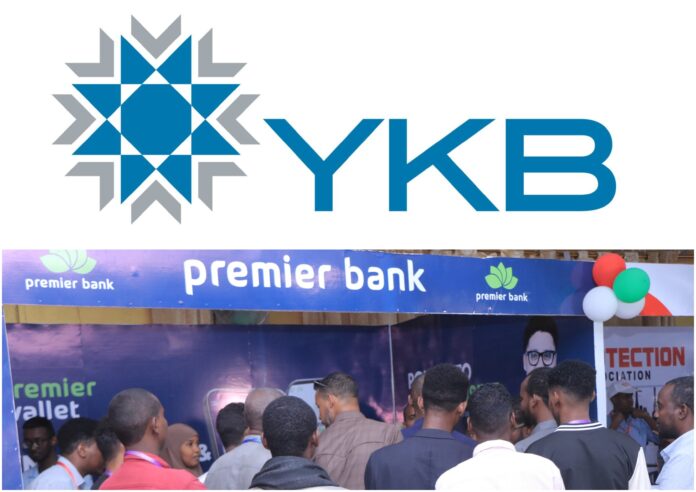MOGADISHU, Somalia (Kaab TV) -The U.S. Treasury’s decision to sanction Yemen Kuwait Bank for Trade and Investment (YKB) is reverberating in Mogadishu, where the bank has been involved in financial transactions.
Accused of supporting the Houthi militia and engaging with Somali groups, YKB’s operations are now under scrutiny for facilitating illicit financial activities tied to regional conflicts.
The Houthis are a U.S.-designated terrorist organization responsible for attacks on U.S. military personnel, regional allies, and international commerce in the Red Sea.
The San’a-based bank has also been linked to financial dealings with Somali groups and institutions, raising concerns about the extent of its involvement in regional instability.
In its statement, the Treasury’s Office of Foreign Assets Control (OFAC) emphasized Yemen Kuwait Bank’s role in providing critical financial channels for the Houthis to access international financial systems.
“The Houthis rely on a few key financial institutions like Yemen Kuwait Bank to finance their destabilizing attacks in the region,” said Acting Under Secretary for Terrorism and Financial Intelligence Bradley T. Smith. The U.S. has pledged to disrupt these illicit networks and support the internationally recognized Government of Yemen in safeguarding the banking sector.
Links to Iran and Militant Groups
The Houthis are reported to use Yemen Kuwait Bank to transfer funds from Iran, including the Islamic Revolutionary Guard Corps-Quds Force (IRGC-QF).
These funds are laundered through complex networks involving exchange houses, banks, and front companies.
According to the U.S. Treasury, the Houthis also collaborate with Lebanese Hizballah and exploit Yemen’s financial sector to finance Iranian oil sales and other illicit activities.
The Houthis have extended their operations to Somalia, engaging in illicit arms trade with groups such as Al-Shabaab and the Islamic State (ISIS).
Somali warlords and clan militias are also implicated in these trades, exacerbating conflict and endangering civilian lives.
Reports have highlighted the involvement of Somali financial institutions in facilitating transactions tied to illicit activities.
Premier Bank in Mogadishu, in particular, has been flagged as a conduit for money transfers between Yemen and Somalia through its hawala unit known as Jubba Express.
Intelligence sources suggest these transactions include funds laundered through real estate investments in Mogadishu, which militants use to conceal finances and diversify income sources.
Al-Shabaab, an Al-Qaeda-affiliated group, has increasingly engaged in local industries such as real estate, fuel imports, and hotel businesses, including operations outside Somalia.
The group has also been reported to manufacture explosives locally and seeks advanced weaponry, including drones and missiles, through networks in Yemen.
In August 2024, Al-Shabaab issued threats to Somali banks cooperating with the government after new taxes were imposed.
According to sources, a settlement was reached between the group and several banks, including Premier Bank, allowing militants to ease financial transactions through banks and the widely used hawala system.
Kenya’s National Terrorism Financing Risk Assessment Report from December 2023 identified Somalia as the highest-risk source of terrorism financing.
Somali remittances to Kenya and Uganda in 2023, amounting to $180 million and $21.9 million annually, have raised alarms about unregulated financial flows.
Premier Bank Mogadishu’s 62.5% acquisition of Kenya’s First Community Bank in 2023 has further stoked concerns.
Financial experts and political figures in Kenya, such as Francis Gaitho, have pointed to Somali investments in Nairobi’s real estate sector as a potential avenue for money laundering.
Reports suggest that Somali oligarchs, diaspora members, and corrupt officials dominate these markets, outbidding local investors and monopolizing lucrative opportunities.
“The real estate sector in Kenya, once a bastion of opportunity for native entrepreneurs, has been significantly infiltrated by Somali oligarchs.
These individuals possess vast resources, often derived from dubious sources, allowing them to outbid investors and monopolize lucrative markets,” Gaitho stated.
In response to the sanctions, Yemen Kuwait Bank described the U.S. decision as politically motivated, denying any violations of international banking standards.
“The timing and motivations behind the aforementioned decision have a political background related to the current escalation between the United States and the government of Sana’a,” the San’a-based Bank said.
The U.S. Treasury’s designation of Yemen Kuwait Bank under Executive Order 13224 demonstrates a decisive step in dismantling financial networks that support terrorism and regional destabilization.
However, effectively curbing terror financing and money laundering requires comprehensive scrutiny of Somalia’s financial institutions.
Without robust oversight from regional and international stakeholders, experts warn that these illicit financial flows will continue to undermine security and stability in the region.


